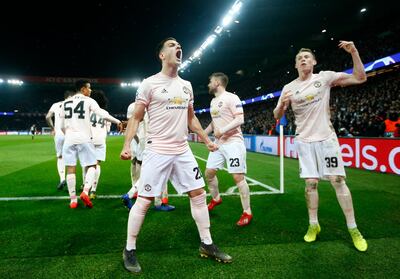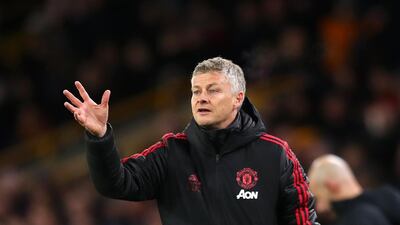For once, the man who restored the upbeat feel to Manchester United sounded downcast. "This was a big step backwards, mainly because of the quality of the possession and the passing," said Ole Gunnar Solskjaer.
That was 10 days ago. Elimination from the FA Cup, courtesy of Wolves, meant the Norwegian had suffered successive defeats for the first time in his interim regime.
Perhaps unintentionally, Solskjaer alighted on a bigger issue, one United have not resolved since Alex Ferguson retired. Jose Mourinho started to feel outdated and his football outmoded as possession and passing became the dominant ethos in the game, courtesy of Pep Guardiola’s Barcelona.
If the title race features both a commonality of thought among managers who value passing and pressing and a battle of ideas – compared to the Catalan, Jurgen Klopp’s style of football is based more upon winning the ball back than retaining it – too often United have conformed to neither school of thought.
They have been left behind. In four of the six post-Ferguson seasons, United have ranked fifth, sixth or seventh for possession (in what feels sadly typical, they were out-passed by Swansea City and Southampton under David Moyes), and they have had the lowest share of the ball of any top-six side this season or last.
In the other two campaigns, they came first and second in the possession charts: but that was under Louis van Gaal. It was pointless passing, sterile domination, sideways distribution. The Dutchman was sacked after a season when United scored a solitary league goal more than Sunderland.
In a sense, Solskjaer has represented his antithesis. The Norwegian has brought back some of the thrill of the chase, an urgency to United’s attacking, a speed on the break and a positive attitude which was reflected in a willingness to look forward whenever they got the ball.
United have been direct, in the right way. They have been reminiscent of some of Ferguson’s teams a decade ago. They restored some of a lost identity.
Solskjaer’s four flagship away wins, at Tottenham, Arsenal, Chelsea and Paris Saint-Germain, came with 39, 37, 33 and 28 per cent of the ball respectively. Nine PSG players completed more passes than any of their United counterparts. It counted for nothing.

And yet Wolves gave United a taste of their own medicine. They had 62 per cent of possession and got caught on the counter-attack. Nuno Espirito Santo’s side had less of the ball, but are a curiosity, boasting two high-class playmakers, in Joao Moutinho and Ruben Neves. Either would surely get into United’s team.
And it reflects a shortfall in their expensive recruitment. Arguably United have never replaced Paul Scholes; nor, given Fred’s rather mixed start to life at Old Trafford, Michael Carrick.
Perhaps the only pure playmaker signed since Carrick’s 2006 arrival was Bastian Schweinsteiger, who still had the football brain but not the legs. If it reflects the way United’s fixation has been on the more glamorous attacking talents, it also highlights where they have fallen behind.
In the last three months, Paul Pogba, Ander Herrera and Nemanja Matic have probably comprised the best midfield trio of United’s wilderness years, but they bring different attributes.

And while Leicester famously won the title with 44 per cent of possession, they represent a remarkable outlier. Subsequent seasons suggest a different brand of football is required and not just because teams who have lesser shares of the ball have to be outstanding defensively. They have less margin for error.
Solskjaer finds himself in the age of the philosopher manager. His mentor Ferguson’s philosophy was winning. United rarely topped the possession charts under the Scot, but their passing came with purpose.
Solskjaer has brought that back, suiting the pace of their players. But as United contemplate their summer business, with their managerial decision surely resolved, it does raise the question if they need a specialist passer, to complement Pogba, perhaps to replace Matic and to compete with the best.
If Solskjaer has rewound the clock in some ways, a test is if his United can evolve to play the kind of attacking possession game that has proved beyond them in recent years, or whether high-speed raids will continue to be a winning formula.


